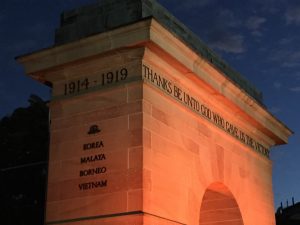Today was my first ANZAC Day since I finished writing The Soldier’s Wife. Last year it was in the middle of the school holidays and everyone was sick, so it sort of slid past without me noticing much.
This year, of course, is the centenary, so the hoop-la is huge. As it should be, I think.
I’m all for commemorating important moments in our past, and in the speeches and feeling of the Dawn Service I attended, there was no glorification of war; but there was of courage, mateship, perseverance and love of country, which is not the same as unthinking patriotism.

I’ve learned a lot about my family since I began writing The Soldier’s Wife. Although I knew in a vague way that my grandfather had served at Gallipoli and been wounded the day before the retreat, that was about it. Now I know as much as can be known about his war record, his wounds and his subsequent illness and return to Australia. I know he lived with those wounds for the rest of his life, and I wonder what wounds he carried which were not visible.
I discovered, also, that my great-uncle, William Sylvie, also served (Uncle Bill, who I don’t remember ever meeting – he died when I was five). He went not only to Gallipolli but also to France, and received the Distinguished Service Medal there. He also went Absent Without Leave a couple of times, and not long after each of these escapades was hospitalised for VD – so we know what he did while he was AWL!
I asked my father about William Sylvie and he said, ‘Uncle Bill? Oh, he was a mad bastard.’ Which made me think about how often it’s the mad bastards who get the medals, and how he was lucky he hadn’t been in the British army. Australia had a ‘three-day rule’ – if you went AWL, but you made it back within three days, you were fined some pay or stuck in the stockade for a few days, but that was it. Over three days, you were a deserter, and you’d be gaoled for some time. In the British Army, any absence was considered desertion, and you were shot.
That started me thinking about the differences between the British and Australian armies. For a start, the Aussies were paid twice as much: seven shillings a day, one of which was retained by the Army and paid out to the soldiers when they were demobbed. (At least, that was the theory. Some of them had to wait for months.) I strongly suspect that the surge in British emigration to Australia after the war was influenced by this symbol of open-handed plenty which the British soldier had seen at close quarters in France.
The other difference was highlighted for me at the Dawn Service yesterday. One of the speakers was a serving officer, who had been in several theatres of war, either as a combatant or as a peacekeeper. He said, ‘The Australian officers had to earn the respect of their men, as they do now.’
British officers – who were often in charge of Australian troops – weren’t used to ‘earning’ the respect of their men. They expected it as a birthright. The British Army was run along class lines – officers were gentlemen, middle class at worst, while other ranks were working class. The gap between officers and men was very wide, and understood to be one of class as well as rank.
Australia, on the other hand, didn’t have an ‘officer class’. It was true that Australian officers tended to be better off and better educated than their men, but this wasn’t necessarily the consequences of an entrenched class system – on the contrary, these officers’ parents were likely to have worked their way to their affluence.
Although we would think of the Australia of 1914 as a much more class-conscious society than ours is now, compared to Britain it was frewheeling and highly socially mobile, with egalitarianism as the basis for all laws, customs and attitudes; summed up by the idea that, in Australia, ‘Jack’s as good as his master’.
This was one of the reasons the British High Command, and their officers, had trouble dealing with Australian units. C.E.W. Bean, the Australian Official World War One historian, wrote, “For most British Commanders, the Australian was the bad boy of the Imperial family”
They were famously undisciplined – if you judged them on how sharply they stood to attention, or how clean their brass buttons were. But they were also famously brave, ferocious fighters, tenacious to the last.
Perhaps we should give the last word to General Sir John Monash, one of the great heroes of World War I: “Not lip service, nor obsequious homage to superiors, nor servile observance of forms and customs…the Australian army is proof that individualism is the best and not the worst foundation upon which to build up collective discipline. ”
So say I.
